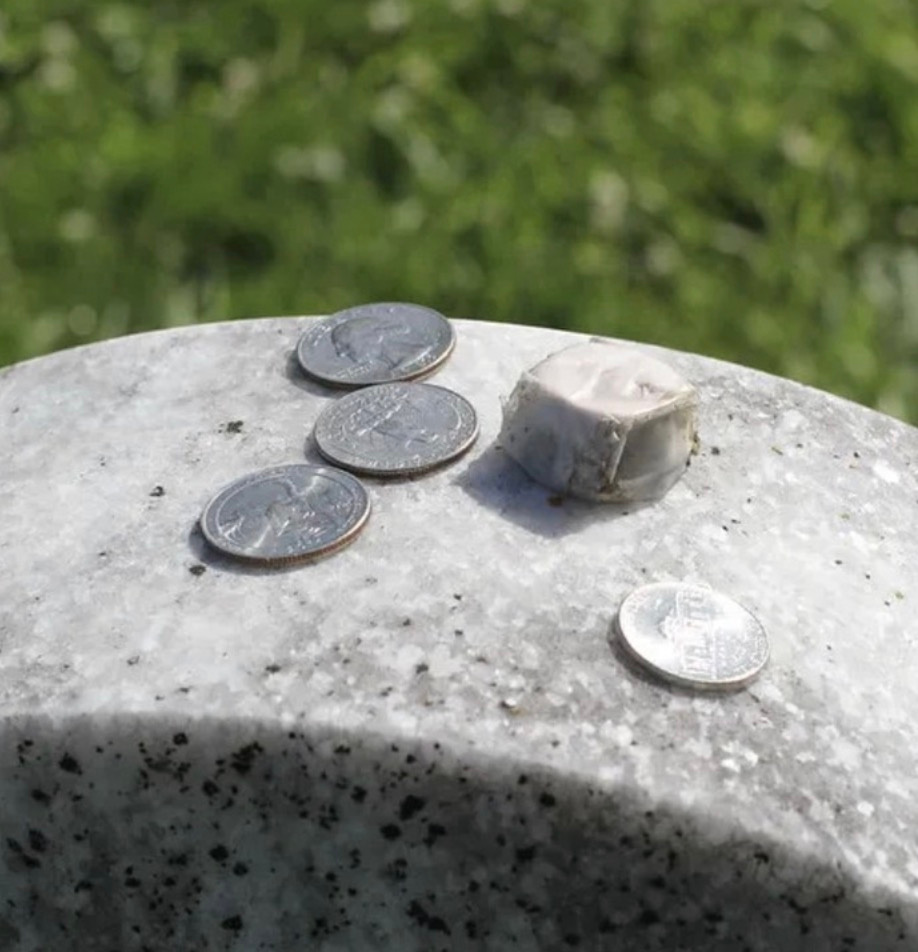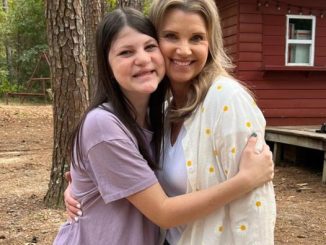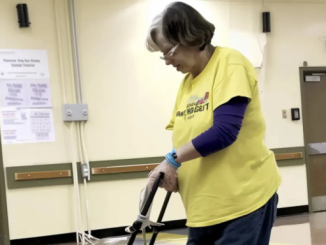
Only weeks after Millie Smith and Lewis Cann learned they were having twin baby girls, they learned that only one would survive.
On April 30, after 30 weeks of a high-risk pregnancy, Smith delivered identical twins, Callie and Skye, the latter who lived only three hours.
Later in neonatal intensive care unit (NICU), Callie slept without her sister in the incubator, with her loving and grieving parents watching over her. In the unit with other babies, an overwhelmed mom of healthy newborn twins innocently told Smith that she was “so lucky” to not have two babies.
Crushed by the words, the new mom couldn’t find the words to explain her loss. Then, she realized that Skye’s legacy was to help other families who lose a child, and it came in the form of a purple butterfly.
In November 2015 Millie Smith and partner Lewis Cann found out they were having their first Child. Smith, who has twins in the family, said she had a “gut feeling” about having a duo and 10 weeks later, doctors confirmed she was expecting identical twin girls.
Less than two weeks after the excitement of knowing they would double the children in their home, the British couple were devastated to learn that one of their babies had a fatal condition and wouldn’t survive after birth.
“During the scan, the doctor didn’t say anything. I was very excited and loved seeing the little babies, but she was silent. Both Lewis and I immediately knew there must be a problem,” Smith said.
Doctors shared the news that one of the babies had anencephaly, which according to the Centers for Disease Control and Prevention (CDC) affects about one in 4,600 babies across the U.S. It’s a serious birth defect where a baby is born without parts of the brain and skull, and “almost all babies born with anencephaly will die shortly after birth.”
Knowing that one baby would die soon after birth, and that there were risks involved for their other baby, the couple decided to move forward with the extremely high-risk pregnancy.
Over the next several months, Smith and Cann named their twins Skye and Callie. “We knew that Skye needed to have a name before she was born,” Smith said. “Knowing she would only survive for seconds or minutes, I wanted her to be named during that time.”
The meaning behind “Skye,” she explained “was somewhere we knew she would always be, that we could look up at the sky and remember our baby.”
When Smith went into labor after only 30 weeks on April 30, she needed an emergency C-section. To help navigate the loss, the couple had a “bereavement midwife” during the birth, and they were put I a special room the called the “Daisy Room,” where families can spend time with a baby before and after she/he passes.
“When the girls were born, they both cried. This was a huge moment, as we were told that Skye would not make a noise or move,” said Smith, who was thankful to have three hours with Skye before she died. “We were cuddling Skye when she passed away. This was the worst moment in our lives. I have never ever felt heartbreak like that before. But I am proud that she fought for so long to spend time with us.”
Born premature, Callie had to stay in NICU while she gained some strength and also in the unit were three other sets of twin.
“Most of the nurses were aware of what had happened, but as time passed, people stopped talking about Skye. After about four weeks, everyone acted as though nothing had happened, meaning the families around me had no idea about our situation,” Smith recalled.
One morning, a stressed mother whose twins were also in NICU, harmlessly said to Smith that she was “so lucky” to not have twins.
“None of the other parents knew what had happened or anything about Skye. The comment was completely innocent and more out of humor…They weren’t to know that I did at one point have two.” Smith continued, “But the comment nearly broke me. I ran out [of] the room in tears and they had no idea why. I didn’t have the heart to tell them what had happened. A simple sticker would have avoided that entire situation.”
It was in that moment Smith realized she had to create something that would speak for parents who had just lost a baby, ensuring the misunderstanding never happens again.
She designed a poster for the NICU explaining both hospital personnel and visitors that any incubator with a purple butterfly on it means that one or more babies, in a set of multiples were lost.
“I chose butterflies, as I felt it was fitting to remember the babies that flew away, the color purple because it is suitable for both boys or girls,” said Smith.
The purple butterfly concept–now under the Skye High Foundation–has spread to hospitals in several countries around the world.
Callie is now a lively, happy seven-year-old, and twin’s memory lives in purple butterfly cards along with other initiatives to help families with babies like Skye all over the world. The purple butterflies now come in numerous forms, like ornaments, cards, blankets, stuffed animals and more.
“Ultimately I will never be able to stop this from happening but the more support groups we can set up and put things in place like the stickers the better it will be. It’s the hardest thing anyone has to deal with,” Smith said.
Why do some people place coins on gravestones?

Coping with the loss of a loved one is a challenging journey, even when they rest in a visitable site. Many individuals express their deep connection by leaving intricate offerings like flower arrangements, and in certain cultures, even snacks. However, the tradition of placing coins on gravestones holds a distinctive significance, primarily associated with military personnel, carrying a profound meaning for veterans and their families.
The origins of the practice are somewhat unclear, with claims suggesting a historical connection to the Roman Empire, though lacking concrete documentation, according to Snopes. Regardless of its historical roots, one undeniable truth remains, those who serve in the armed forces, along with their loved ones, endure sacrifices that often surpass common understanding.
The custom of leaving coins on gravestones can be traced back to the Vietnam War era, where it served as a practical means of communication amidst the divisive political climate surrounding the war. Leaving a coin became a subtle yet meaningful gesture, avoiding potential contentious discussions with the soldier’s family about the politics of the war. This revelation is shared on the American Legion Website.
Beyond its practical origins, the tradition of leaving coins on gravestones has evolved into a symbolic act of showing respect and honoring fallen comrades. Each coin type carries a distinct meaning in this poignant practice. A penny symbolizes a simple visit, a nickel holds sentimental value as it signifies shared experiences in boot camp, a dime represents serving together, even briefly, before a transfer, and a quarter, perhaps the most significant, indicates that the individual was present during the time of death, offering solace to the grieving family.
This tradition of military personnel leaving coins is not the sole connection between the military and monetary symbols. Challenge coins, a beloved military tradition, have deep roots dating back to World War I, symbolizing unity among those who have served. While challenge coins hold sentimental value and represent unity, they lack any monetary worth.
Coins, as symbols, extend beyond military traditions, playing roles in various cultural practices. Coins are often seen as symbols of good luck, goodwill towards newlyweds, and objects for making wishes. Throughout history, there have been instances of individuals being buried with their wealth, although not necessarily in the form of coins. Abraham Lincoln, for instance, was reported to be buried with two-half dollars over his eyes.
While the specific symbolism of currency may remain unclear in the tradition of placing coins on gravestones, the practice signifies a bond that transcends superficial understanding. It serves as a powerful and enduring tribute, acknowledging the sacrifices made by those in the service and their families, ensuring their dedication is never overlooked or forgotten.



Leave a Reply